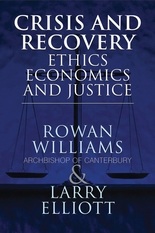BARRY WINTER argues that a recent article by Jon Cruddas and Jonathan Rutherford, two men at the heart of Labour’s policy review, is the most imaginative line of thinking for the left and the party we have seen for more than a generation.
To begin, something about the two authors of the article, ‘The Common Table’.
Jon Cruddas is head of the Labour Party’s policy review process. His was an imaginative and brave appointment by Ed Miliband. Cruddas is not a really policy wonk but is more interested in political philosophy. He’s willing to go where others perhaps fear to tread.
Cruddas seeks to regenerate the broad, ethical socialist tradition associated with the ILP. He has written two insightful, political reviews of George Lansbury and Clement Attlee, both published on this website. Both these Labour leaders had ILP backgrounds. Lansbury is perhaps better known for leading the revolt of the Poplar councillors, while Attlee was the prime minister in the Labour governments of 1945-51.
From an Irish Catholic background, Jon Cruddas is MP for Barking and Dagenham where he fought off a major challenge by the BNP. Originally a supporter of Tony Blair’s third way, he became quickly disillusioned by New Labour. He voted for David Miliband in the leadership contest but later admitted this was a mistake.
Jonathan Rutherford is Professor of Cultural Studies at Middlesex University and wrote the book After Identity. He’s coordinator of the New Political Economy Network. For eight years, he was the editor of the respected journal, Soundings, but recently stood down to join Labour’s policy review team.
Both Jons have written a range of articles together and co-edited several e-books. This particular article comes from an interesting publication, Crisis and Recovery: Ethics, Economics and Justice (2010). It was edited by Rowan Williams, then the Archbishop of Canterbury, and Larry Elliott, economics editor of the Guardian, who both make contributions.
The book is a fascinating amalgam. It carries an article on Keynes by his biographer, the scholar, Robert Skidelsky. There a piece by the briefly influential Red Tory, Phillip Blond; plus a contribution by an investment banker on the Church of England’s ethical investment advisory group; along with Zac Goldsmith, wealthy Tory MP for Richmond and long-time editor of the Ecologist. Then there’s Will Hutton, the influential columnist for the Observer and a director the The Work Foundation; and Adam Lent, head of economic affairs at the TUC.
So – an intriguing and array of political thinkers, interested in both economics and morality.
Morality
As the blurb on the book makes clear, “The financial crisis is about more than money. It is also about morality, casting an uncomfortable light on the links between the activities of bankers and the wellbeing of society as a whole.” The aim of the book is to “open up the ethical debate in the search for a fairer vision of economic justice”.
This, I would add, is very much needed as a response to the present government which is using the economic crisis and austerity to further the neo-liberal agenda: laying into the NHS, welfare, education, local government, public sector workers, the low paid, working women, people with disabilities, and migrants, among others.
Cruddas and Rutherford begin by highlighting how wealth in Britain is being entrenched “alongside some of the highest and inequality in Europe”. It says we live in a “consumer wonderland” but one where stagnant wages have led to record levels of debt. Ours is a society which has seen the decline of trust and a diminution of democracy and freedom, they argue.
The economy was built on “bubbles and speculation”, posing the question: “Did the government nationalise the banks or did the banks privatise the government?”
They argue that instead of the crisis being an historical turning point for the left, neither financial capitalism nor its ideology of neo-liberalism has been defeated. For this, the authors directly blame New Labour for leaving behind an “ideological vacuum”. This means that we currently lack an effective, political agency for social change. Social change for them will come from going back to first principles and building alliances. Labour alone cannot achieve these changes.
This, I would suggest, is a powerful and succinct analysis of the situation facing society and, more specifically, the left. I might add that sections of the ‘leftie’ left seem to be locked into their own little universes. This is not the fault of New Labour, critical as I am of the Blair and Brown leaderships. Both thought a bright future lay ahead by holding onto the coat-tails of hyper-financialised capitalism. All we had to do was to jettison the past and speed in the future, shaping people to fit the needs of the new, shiny economy.
To add to the predicament presented by the two Jons, I would add that we are witnessing a massive wave of disenchantment with a variety of institutions: with politics generally, and political parties and politicians more specifically; with the media, the press and even the BBC; with the police, the public sector, and perhaps even with the NHS; and with the banking world that still manages to get its nose in the trough (witness Goldman Sachs contemplating delaying bonuses until the government’s lower rates kick in). In fact, the only institution that seems to have survived intact as far as I can see is the monarchy!
I’m not being entirely fair here because later the two authors do acknowledge popular disaffection with representative democracy and the loss of confidence in political parties. But I want stress the importance of recognising that we have an uphill struggle. It will take time, patience and resources to create a political culture attractive to wider society. It will be a challenge to win back people’s trust.
The authors usefully focus on housing issues as central to contemporary developments. They comment on how Margaret Thatcher’s ‘right to buy’ council housing gave the ‘free-marketeers’ a distinct political advantage. It provided them with three decades of neo-liberal dominance at the expense of the old post-war consensus.
It also provided the basis for economic growth and tied people’s futures to the casino economy. Through our savings, pensions and mortgages we were caught in the web of financial capital. And the economy boomed. Never mind that manufacturing and traditional forms of employment were in decline. Never mind the gaping north-south divide. Never mind that wages were not keeping pace, that more people, particularly women, were in part-time, low paid jobs.
The thinking went along the following lines. So what if inequalities are escalating? You can always borrow money to get yourself out of tight corners, or buy those cherished consumer goods by borrowing a bit more. ‘Go on, you know you are worth it.’
As the authors point out: “Gordon Brown, in his Mansion House speech, hailed ‘the beginning of a new golden age for the City of London’.” Later he went on to predict the end of boom and bust.
The authors then consider the social and cultural impact of this growing social inequality – how, among other things, it leads to growing individualism, and to a punitive approach to the poor who are blamed for their own poverty and are socially derided. They are lying in bed, we are told, while the rest of us toddle off to work (although not all of us in ministerial cars).
Class and community
The section on ‘class and community’ acknowledges that traditional class identities have fragmented. They put it well when they write: “We live in a time, not of capitalism without class, but of capitalism destroying class cultures and class relations and recreating them around new modes of production and consumption.”
In other words, class is not disappearing but is in a state of flux; it is being reconfigured (one might add globally as well as nationally and locally). They focus particularly on the changes in the old order where there was a male breadwinner, to new strains where women have to have jobs as well as look after the kids.
Where once traditional class communities – I might add in spite of their many failings – could often defend working people, there is now much greater social isolation. Instead, what we are left with, they argue, is a “cultural melancholy” for the national past with all the dangers this represents.
This “social recession”, they claim, extends very widely. They highlight the growing incidence of childhood depression and behavioural problems, and mental health issues among adolescents. The young, in that sense, best exemplify what’s happening to society at large.
So where do we go from here?
The authors affirm that there cannot be a return to class-based paternalism and consider instead how to establish ethical relationships between people and to the wider society.
Here they resurrect a term long associated with my own political tradition, called ‘ethical socialism’. While it is encouraging to see such ideas being revived, I do wonder whether a more widely accessible concept might be needed.
They argue that “the answer lies in a politics that values the social goods that give meaning to people’s lives: home, family, friendships, good work, locality”, and “imaginary communities of belonging”. For them, it is in ordinary life where we can create an “ethics of the common good”.
They turn to a rather forgotten sociologist, Norbert Elias, to make their case. Elias rejected the argument that individuals are self-contained. Indeed, for him the pursuit of independence is an illusion, a view which they share. They say: “human beings are social and emotional beings who are dependent upon one another throughout their lives”. Elias went on to say that relationships are not even about the living but also include the dead and the unborn, beliefs found among many indigenous peoples.
Cruddas and Rutherford draw on earlier writers too, including some from the late 19th century, like LT Hobhouse, who said “there is a common humanity deeper than all our superficial distinctions”. This means that politics is subordinate to ethics, existing for the sake of human life. There is no ‘I’ without first the ‘we’.
If I was to reduce their argument to one sentence, it would be this: “Our interdependency is fundamental to our existence.”
As they duly acknowledge, these ideas are the basis of politics. But, while they are essential, to “realise a new society”, as they phrase it, we need more than this. As they argue, ethical socialism necessitates a radical change in the economy; from casino capitalism “to a low-carbon, more equitable and balanced form of economic development”.
I would add here that we also have to devise an appropriate, flexible political strategy, something which they address later.
The authors leave open whether the aim is to construct a ‘responsible capitalism’ which Ed Miliband espouses, or whether they would go beyond that, to what the left calls socialism. Their ambivalence is understandable. They certainly argue that capitalism must be made accountable to workers and citizens through regulation, economic democracy and “forms of common ownership”.
The Labour Party
To reach that better state of affairs (however it is defined), must involve “a broad range of progressive social and political movements in rebuilding a centre left coalition”, they note.
I very much welcome these remarks because there is a recognition here that Labour can achieve much less on its own than it can if it is part of a wider movement for change. The Labour Party has not thought in such ways for decades, if ever.
As they emphasise: “Without this coalition, there will be no organisation of political actors and the political agenda will remain unchallenged. This will mean new kinds of transformative political alliances. At its best, Labour has been at the heart of broader social and cultural movements in a mutual exchange of ideas and practices.”
I need a little persuading that Labour can manage this, particularly in the short term, but I live in hope that it might become possible. It will probably need other agencies to encourage such a shift in direction.
They continue (and here I am in full agreement): “Without this coalition, there will be no deep-rooted hinterland of support to sustain a future progressive government. It will be quickly blown off course.”
In terms of specific initiatives, they want to see “markets re-embedded in society”, and banks as public utilities helping to build new homes. They say, bluntly: “We can’t afford the City to operate as a law unto itself.” In addition, they suggest a series of reforms on welfare and pensions, child welfare, democratising the public service, and a citizens’ income that are light years away from where we stand today. I certainly welcome the direction of travel.
They clearly recognise that such changes will involve a fight with vested interests. As they argue: “Real change will require a strong government that has widespread active support. This can only happen when we build alliances and develop a broad consensus of centre-left opinion.”
They conclude by recognising that this amounts to a huge challenge and I can certainly endorse that. However, while I welcome their approach, I fear that we have a much longer journey ahead that perhaps they are recognising here.
I think we also need stronger left groups, individuals and campaigns to share this agenda. I can’t imagine these ideas will be swallowed whole by the present Labour Party or its leadership because, in truth, there is a lot here for the party to swallow. But am I delighted that this is being aired? Yes! Do I think this could provide a start? I certainly hope so.
However, we have not yet come anywhere near getting the wind in our sails needed to propel this project forward. Such a strategy is unlikely to fit neatly with the electoral schedules, always a constraint for Labour. That does not mean we shouldn’t try but it does mean, for me at least, we should worry a little while hoping a lot.
Along the way the journey will involve compromises which some will always be eager to denounce as betrayals. However, this article offers the most imaginative line of thinking we have seen for more than a generation. It deserves our support, even though we must always have the right to disagree.
—-
This is an edited version of a talk originally given to the Leeds Taking Soundings group on 16 January.
‘The Common Table’ by Jon Cruddas and Jonathan Rutherford was in Crisis and Recovery: Ethics, Economics and Justice edited by Rowan Williams and Larry Elliott, published by Palgrave Macmillan in 2010.
For more information on Labour’s policy review process, click here.
Jon Cruddas has recently edited an e-book on One Nation Labour, published by Labour List and available here.



11 February 2013
Barry, I find your response really helpful: I can see that if neo-liberal ideas hadn’t been so dominant over the last 35 years or so, people would have been more open to radical democratic politics. Perhaps cynicism is so ingrained that people are resistant to the Left, not because they are anti-Left, but because they are anti-politics.
My concern, though, is that the Left may not have much of substance to offer either because it has become so transfixed by neo-liberal discourses that it can no longer think straight or because it is genuinely devoid of policies which might work in practice.
If you look at Venezuala, for instance, despite the best endeavour of the state to stimulate small business in poor areas through microfinance and infrastructure investment, too little has been achieved. France, despite Hollande (no admirer of the Anglo-Saxon market economy), may be doing better than the UK, but it is still not prospering.
Once we agree we are opposed to neo-liberalism, we then have to develop policies which begin to take us in a different direction. In reality, there aren’t too many of those, and the most ‘out there’ recent example of successful state intervention came from BIS in the dying days of the last Labour government (thanks to Peter Mandelstam, refreshed by his time as an EU commissioner).
There’s maybe also things we can learn from the 74-79 Labour government, as this article from the IPPR website indicates:
http://www.ippr.org/juncture/171/10304/not-all-the-bad-old-days-revisiting-labours-1970s-industrial-strategy
Obvious answers don’t leap out from the article, but there’s a tentative suggestion, supported by a quote from Denis Healey’s authobiography, that there might be a path we nearly went down that could have worked, and we have the opportunity to find our way there again.
Sadly, that doesn’t exactly sound like ‘workers of the world unite; you have nothing to lose but your chains’!
31 January 2013
Jonathan’s helpful response highlights the public’s loss of faith in an active state being able to regenerate the economy. His point could be broadened by acknowledging that many people have lost confidence in governance and the state more generally. This lack of credibility stems from the dominance of neo-liberal ideas for the last 30 years.
The US academic, Jacob Hacker, writes: “The hallmark of contemporary public attitudes is not public conservatism but public cynicism and mistrust, fuelled by the economic trends of the last generation and the sense that government is out of touch.” For him, this means rebuilding the idea that government can make a positive difference, although he ruefully adds, “The challenge, however, is that progressive reform will require using a broken political system to fix a broken political system.”
I think he’s broadly right about this. The Labour Party is an imperfect instrument for this but it is what we have. As I said in my earlier piece, it will need broader movements of support to get anywhere. Labour will have to encouraged into building living relationships with the wider society. While Cruddas and Rutherford recognise this, I am not confident it has penetrated deeply into the Shadow Cabinet.
For example, I recently heard Rachel Reeves, shadow Treasury spokesperson, give what, in many ways, was an excellent speech on the need and means to regenerate the northern economy. But nowhere did she consider how to mobilise wider support, still less how these changes raise important issues about democracy and decision making that goes beyond elites.
( http://www.labour.org.uk/rachel-reeves-speech-to-ippr-north-on-the-northern-economy,2013-01-28)
Contrast this with Stewart Wood (the Labour peer and shadow cabinet Minister without Portfolio) who wrote “neo-liberalism ignored what makes for strong and cohesive communities, marginalised the vulnerable and rode roughshod over democracy”.
He continued: “Neo-liberalism both relies on scepticism about what politics can do and reinforces that scepticism with its denigration of politics, of active government, and of those who work in it… (T)he first and most urgent fight must be for the public’s faith that politics, at its best, can be a force for improvement in their lives.”
So there is some hope!
20 January 2013
Perceptive summary of the politics of New Labour and the challenges ahead.
Barry is absolutely spot on when he says that people have lost faith in politics, but he doesn’t mention the most fundamental loss of faith that, I think, underlies this, which is shared to some degree by everyone except unreconstructed lefties: I mean, the loss of faith in the idea that an active state can develop the economy.
Most people – even on the Left – have taken Mrs Thatchers statement to heart: ‘all Socialists know how to do is spend other people’s money’, and what most people want to see are successful growing businesses, offering job opportunities and good money. Once they can see the economy growing again, they might give the Left another chance in government, so they can spend increasing tax receipts on public services.
The next election is wide open because people are sceptical about the ability of government to address their concerns. It might all come down to which leader is best looking, because why not?